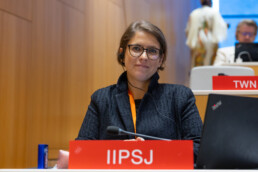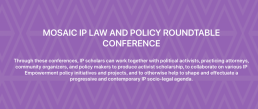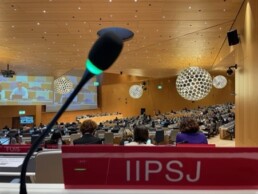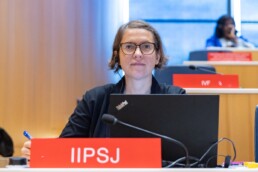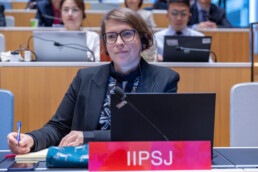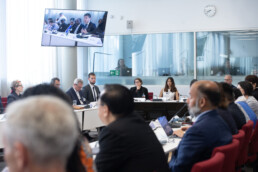Blog Post: IIPSJ Attendance at the 65th World Intellectual Property Organization General Assemblies
(WIPO GA) (Geneva, 9-17 July 2024)
By Dr. Metka Potočnik (she/her/hers), Senior Lecturer in Law, Wolverhampton Law School
IIPSJ attended the 65th World Intellectual Property Organization (WIPO) General Assemblies (GA),
in their capacity as the WIPO Accredited Observer. Now attending regularly, IIPSJ participated in the
official hearings at the WIPO Headquarters in Geneva, with the Associate Director for International
Programs, Dr. Metka Potočnik, attending the length of the proceedings in person. These
assemblies brought together another record number of delegates. A full list of participants is
available here, and all the sessions are available for viewing here.
IIPSJ attended the GA sessions for the second time in Geneva, after having observed several WIPO
meetings online, since 2020. IIPSJ continues to take the GA meetings as an opportunity to build
strategic partnerships with Member States and other stakeholders, interested in creating access,
inclusion and empowerment for under-represented creators and innovators in the global eco-
system. IIPSJ contributed to the discussion in writing (see here), and in the session (view here, at
02:31:12).
IIPSJ representative, Dr. Metka Potočnik, also attended the 11th WIPO-NGO Stakeholder Dialogue,
which was organised in parallel with the 65 th WIPO GA and took place on Thursday, 11 July 2024, at the WIPO New Building. WIPO Director General Tang, Deputy Director Edward Kwaka and other WIPO experts met with over sixty Accredited Observers and NGOs, in discussing global challenges, which require a multi-stakeholder response. IIPSJ sent their question in advance, and continued informal conversations with WIPO and several interested stakeholders for the duration of the GA meetings. The event has been placed in the spotlight for its importance, and more can be read here.
IIPSJ is continues to contribute to future discussions in WIPO, with the aim of building a more inclusive WIPO eco-system. The IIPSJ team are working towards a meaningful participation in the 46th Session of the Standing Committee on Copyright and Related Rights (SCCRR) (see here, 2025 dates to be confirmed) and the 33rd Session of the Committee on Development and Intellectual Property (CDIP) (see here). If you are interested in contributing to IIPSJ work in this space, do contact the IIPSJ directly.
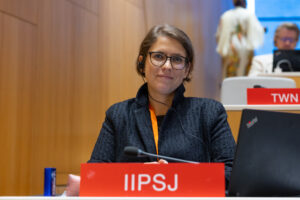

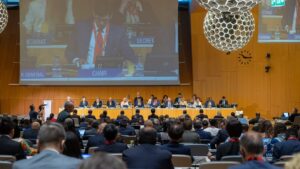
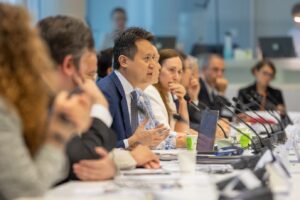
Blog Post: IIPSJ Oral Statement to WIPO
IIPSJ Oral Statement to the 65th World Intellectual Property Organization (WIPO) General Assemblies (GA)
July 9-17, 2024
Honorable Chair, Director General, distinguished Delegates, thank you for the floor.
Institute for IP and Social Justice stresses that IP systems must balance economic and
social aims equally, in a manner that offers access, inclusion, and empowerment for all.
WIPO’s IP Gender Action Plan should include initiatives designed to also address
intersectional discrimination and misogyny in the creative and innovative ecosystems. We
stress the need to move away from projects that prioritize only “getting more women into the
system.” Intersectional discrimination and misogyny are systemic barriers that must be
corrected. IP laws must form part of the solution.
Efforts to address intersectional discrimination must also be at the heart of data collection
projects. More should be done to develop methodologies for non-registrable IP rights
(mainly, copyright); and methodologies beyond the mere binary counting of genders, so that
we also include gender-diverse people.
For more, please see our written statement.
Prepared by Dr. Metka Potočnik
IIPSJ Associate Director for International Programs
Blog Post: The National Strategy for Inclusive Innovation - A Framework for IP Social Justice
The National Strategy for Inclusive Innovation: A Framework for IP Social Justice
On May 1, 2024, the United States Patent and Trademark Office announced the adoption of the National Strategy for Inclusive Innovation (NSII). The NSII was developed by the USPTO with support from the Council for Inclusive Innovation (CI2), and “is based on a vision for United States leadership in innovation that will lift communities, grow the economy, create quality jobs, and address global challenges.” The USPTO intends to accomplish the vision set forth in the NSII by increasing participation in science, technology, engineering, and mathematics (STEM) and innovation, both generally and through related entrepreneurship, and thereby “unleash every American’s ability to fully take part in the innovation economy.”
The NSII embodies a bold initiative through which to pursue the mandate of the Unleashing American Innovators Act, signed into law by President Biden on December 29, 2022, and to achieve the social justice obligations and effects integral to an effective intellectual property ecosystem. While promoting IP endeavor has been at the forefront of American advances in science and technology since our nation’s inception, as noted in the NSII, leading research reveals that participation in the American innovation ecosystem is “exceptionally unequal”. A recent report by the USPTO indicates that only 12.8% of all inventors named on U.S. patents are women, while a Harvard study revealed that White Americans are three times more likely to become inventors than Black Americans, and that the children of the top 1% of income earners are 10 times more likely to become inventors than children with family incomes below the median.
The NSII represents a targeted, comprehensive strategy for ensuring that all Americans enjoy meaningful opportunities for access to, inclusion in, and empowerment through the IP and innovation ecosystem. The NSII is structured around four “cornerstone” goals, each addressing “a critical inflection point in the lives of potential innovators”: (i) Inspiring New Generations of Innovators; (ii) Educating and Empowering Innovators; (iii) Advancing Inclusive Innovation; and (iv) Bringing Innovation to Market. Based upon these cornerstone goals, the NSII includes a range of specific policy recommendations, from enhancing efforts to standardize and scale youth innovation education to expanding initiatives through which to leverage and increase commercialization support and tech transfer to benefit all American communities.
Through the NSII, the USPTO takes a leadership role in meeting the great challenge of confronting the demographic, economic, and geographic under-representation of citizens in the innovation economy. Every American must enjoy the opportunity and the privilege to contribute to the innovation storehouse, and to achieve this the NSII seeks to address every underserved cohort, including rural regions, veterans, elder communities, persons with disabilities, those who have educated themselves in non-elite or non-traditional settings, including trade schools, community colleges, or work experiences, as well as those who are under-resourced. To cultivate our nation’s full potential, “the United States must make sustained investments in its most important asset—the American people—by ensuring that every individual—irrespective…of ethnicity, gender, disability, or location—has access to the resources and opportunities to innovate.”
IIPSJ commends the National Strategy for Inclusive Innovation and its social justice-oriented perspective towards the American innovation ecosystem. We hope you will review the full report at https://www.uspto.gov/initiatives/equity/national-strategy-inclusive-innovation.
Press Release: Institute for Intellectual Property and Social Justice Expands Board, Goals
Press Release: Institute for Intellectual Property and Social Justice Expands Board, Goals
The Institute for Intellectual Property and Social Justice, a twenty-one year old organization founded by Howard University law professor, Lateef Mtima, has expanded its board to include twelve thought leaders in IP legal practice and policy. The expansion will facilitate IIPSJ’s ability to focus nationally on its goal of promoting social justice through the most valuable property currently in existence: intellectual property.
“IIPSJ has been able to accomplish quite a bit from a modest beginning,” said Mtima. “It has helped to foster a more socially responsible and inclusive conversation about the role of IP protection in our society. Through the capabilities and insights of this very distinguished board IIPSJ will be able to build significantly upon these accomplishments.”
The expanded board will be chaired by Idris Mckelvey, Lead Patent Counsel at the Estée Lauder Companies Inc, and an alumnus of Howard University School of Law (2005). Its new members include:
Jeremiah Chan, Esq., Associate General Counsel – Meta Platforms
Joseph Drayton, Esq., Partner – Proskauer Rose LLP
Izu Emeagwalli, Esq., Executive Director and Assistant General Counsel – J.P. Morgan
Oliver St. Clair Franklin CBE, Honorary British Consul for Greater Philadelphia
Jonathan Goins, Esq., Principal – Lewis Brisbois Bisgaard & Smith LLP
Philip Hampton, Esq., Partner – Polsinelli P.C.
Suzanne Harrison, Principal – Percipience LLC
Tom Irving, Esq., Partner – The Marbury Law Group, PLLC
Esther Lim, Esq., Partner – Finnegan, Henderson, Farabow, Garrett & Dunner, LLP
Lita Rosario-Richardson, Esq., Shareholder, Chair Entertainment Law Group – Shulman Rogers, P.A.
Tony Sebro, Esq., General Counsel – Change.org
Karyn Temple, Esq., Senior Executive Vice President and Global General Counsel – Motion Picture Association
“We are looking forward to our first expanded board meeting on April 4,” said Mckelvey. “The recruitment process generated a lot of enthusiasm for using this tool, intellectual property, which is not often associated with social justice, to create a more just and prosperous society.”
Mosaic 2023 Event Recap
On October 27-28, 2023, IIPSJ, along with University of Illinois Chicago Law, hosted the 9th Annual IP Mosaic Conference with the theme IP Rights and Wrongs: Advancing Social Justice and Ethics.
During the conference, attendees were able to listen to two plenary panel presentations which are saved on our Youtube page. The presentations were:
International IP and Climate Change
Moderator: Metka Potočnik, Senior Lecturer in Law, University of Wolverhampton, Law School and Director of The F-List for Music CIC
Panelists:
- Peter Oksen, World Intellectual Property Organization, Global Challenges Division
- Antony Taubman, World Trade Organization, Intellectual Property Division
Copyright Behind Bars: At the Intersection of Systemic Incarceration and IP Social Justice
Moderator: John R. Whitman, Ph.D., author, Executive Director, Museum for Black Innovation and Entrepreneurship
Panelists:
- Jeanie Austin, Ph.D., Librarian, Jail and Reentry Services, San Francisco Public Library
- Wendy Jason, Founder and Director, Justice Arts Coalition, nonprofit national network for those creating art in and around the criminal justice system (invited)
- Doran Larson, Ph.D, Professor of Literature, Hamilton College and Founder and Co-Director of the American Prison Writing Archive
- Viva R. Moffat, Professor of Law, Co-Director, Intellectual Property and Technology Law Program, Sturm College of Law, University of Denver, advocating for IP rights for currently/formerly incarcerated and society
- Fury Young, Founder and Co-Executive Director, Die Jim Crow, the first nonprofit record label for currently and formerly incarcerated artists
In addition, participants were able to present their papers and ideas for papers and receive feedback from attendees on their ideas. These five separate paper presentation panels were:
- IP & Tech
- 2023 Ben Liu Scholars
- The Role of Patent Law: from Technicalities to Social Correctives?
- IP and Social Action: Ways to Empowerment?
- Music Creators and Society: System Reboot or Reform to Building Better Partnerships?
We hope you can join us this fall as we celebrate the 10th Annual IP Mosaic Conference at in person and online at Marquette University Law School (dates TBA).
Blog Post: 2023 End of Year Recap
2023 End of Year Recap
As we close another successful year, we want to highlight some of the impact of your contributions for 2023:
The Nexus of Social Justice and Intellectual Property
- Our monthly newsletters (https://iipsj.org/latest-news/) provided readers with timely and relevant recent developments in intellectual property law that have particular impacts on diverse communities and the concept of social justice, including:
- The Supreme Court Decision in Gonzalez v. Google (https://iipsj.org/gonzalez-v-google/), which IIPSJ Founder and Director Lateef Mtima noted “implicitly acknowledges the complexity of the issues and interests impacted by Section 230, including the need to preserve venues through which marginalized and vulnerable voices and perspectives can be heard.”
- The Supreme Court Decision in Warhol v. Goldsmith (https://iipsj.org/warhol-v-goldsmith/), which IIPSJ Founder and Director Lateef Mtima noted “ensures the vitality of the Fair Use doctrine while protecting artists, particularly marginalized and developing artists, from the distortion of the doctrine into a tool for the misappropriation of one artist’s work by another artist with greater fame and public recognition.”
- Public Knowledge’s paper entitled Streaming in the Dark: Where Music Listeners’ Money Goes – and Doesn’t, which explained how billions in music subscription revenues “trickle up” into the pockets of “Rightsholding Middlemen,” leaving comparatively little for the artists themselves (https://publicknowledge.org/policy/streaming-in-the-dark-where-music-listeners-money-goes-and-doesnt/).
- Working with our various academic partners, IIPSJ organized the ninth annual IP MOSAIC Conference, where we created a space for IP scholars, political activists, practicing attorneys, community organizers, and policy makers to discuss papers and collaborate on various topics of IP empowerment. (https://iipsj.org/programs/ip-mosaic/) The theme was IP Rights and Wrongs: Advancing Social Justice and Ethics.
Diversifying the Legal Field and the Intellectual Property Bar
- For two decades, the IIPSJ IP and Social Justice CLE program (https://iipsj.org/2023-ip-social-justice-cle-recap/) has provided a venue through which to showcase minority and women IP attorneys. The 20th Annual IP & Social Justice CLE program (https://youtube.com/playlist?list=PLpjeDSnL4i4lEMJf0N-48iqiZYF-CBvSb) explored the latest developments in IP law, including the relevant social justice impacts, strategies, and opportunities for enhancing the social efficacy of the IP legal regime.
- Working with our various academic partners and event sponsors, IIPSJ worked with Charlie Bingham to organize the 5th Annual HBCU IP & Tech Law Summit (https://iipsj.org/programs/hbcu-ip-tech-law-summit/), where the audience was treated to leading technology lawyers discussing Artificial Intelligence, Data Security and Privacy, Tech in Sports & Entertainment, Blockchain, Cybersecurity and more.
- In August, IIPSJ participated in the United States Intellectual Property Alliance (USIPA) Increasing Diversity in Innovation (IDII) (https://increasingdii.org/) 2nd Annual Conference, where companies, law firms, universities, the USPTO and the U.S. Department of Commerce in the came together to discuss increasing diversity in the U.S. innovation ecosystem, and how they are working to transform it. IIPSJ Founder and Director Lateef Mtima shared his insight by speaking in the “What Can Universities Do?” panel.
- With the goal of highlighting minority IP attorneys to serve as role models to encourage the pursuit of careers in IP practice, IIPSJ continued our Attorneys of Color in IP interview series (https://iipsj.org/blog-post-ip-attorney-interviews/), which featured interviews with Professor Daryl Lim, and trademark and fashion attorney Mariessa Terrell.
Advocacy for Participation in the Intellectual Property System
- IIPSJ Founder and Director Lateef Mtima co-authored and submitted an amicus brief to the Supreme Court of the United States regarding Gonzalez v. Google (https://iipsj.org/amicus-brief-gonzalez-v-google/), which cited the IIPSJ publication Diversity and Inclusiveness in the Online Creator Economy.
- In April, IIPSJ attended (https://mailchi.mp/iipsj/wrke-fellowship-update-ip-sj-article-events-of-interest?e=6f3c6b845f) Race + IP ’23 (https://raceipconference.org/2023/), where audiences had the opportunity to hear from a number of illustrious Critical Race IP scholars, including IIPSJ Founder and Director Lateef Mtima, who talked about a forthcoming book (https://www.cambridge.org/core/books/cambridge-handbook-of-intellectual-property-and-social-justice/981BDAF47503507CCB43ED96FDFADF1A) on IP and social justice. The theme of this year’s conference was “The Imperial Scholar Revisited,” which covered wide variety of topics, such as traditional knowledge, the history of music, abolitionism, inclusion, institutionalism, and their adjacency to IP.
- In July, IIPSJ Associate Director for International Programs, Dr. Metka Potočnik, attended the 64th World Intellectual Property Organization (WIPO) General Assemblies (GA) (https://iipsj.org/iipsj-attendance-at-the-64th-world-intellectual-property-organization-general-assemblies/) at the WIPO Headquarters in Geneva and represented IIPSJ as a WIPO Accredited Observer. These assemblies brought together a record number of delegates, with over 1,200 delegates in attendance, which exceeded the pre-Covid numbers of attendance in the General Assemblies.
Community Outreach that Empowers Creators of Color to Share, Protect, and Monetize Their Work
- IIPSJ continued our Intellectual Property for the People Series (https://iipsj.org/programs/ip-for-the-people-open-academy/) to help creators, inventors, and entrepreneurs from communities of color understand and explore the rights and resources available to them. This year’s series included the following free, one-hour webinars: Name/Image/Likeness Rights, IP Basics for Creators, IP for Entrepreneurs, USPTO Provides Trademark Basics for Entrepreneurs, Starting/Funding Your Business, and Business Agreements/Contracts. Replays of all sessions are available on our YouTube page (https://www.youtube.com/playlist?list=PLpjeDSnL4i4mPRA4CX44FjLcSUv1CyMug). The series will continue to run in 2024, with necessary topics such as filing patent and trademark applications, and how development of IP works within the context of a business.
- IIPSJ’s inaugural Wikimedia Race and Knowledge Equity (WRKE) Fellow (https://iipsj.org/wikimedia-race-and-knowledge-equity-fellowship/), legal expert Shreyanka Mirchandani Changaroth, finished the one-year, full-time fellowship in September, during which time she lead work with IIPSJ to explore ways to impact IP policy in the U.S. through community engagement (https://iipsj.org/wikimedia-highlights-wrke-fellow-contributions-in-inaugural-year-review/). As we look ahead to 2024, IIPSJ is pleased to announce the 2023-2024 Wikimedia Race and Knowledge Equity (WRKE) Fellows: Kyra Abrams, Akshat Agrawal, Kainen Bell, Albert Fox Cahn, Shubha Ghosh, and Oroma Womeodu (https://iipsj.org/2023-2024-wrke-fellows/).
Blog Post: IIPSJ Attendance at the 44th WIPO Standing Committee on Copyright and Related Rights (SCCR)
IIPSJ Attendance at the 44th World Intellectual Property Organization Standing Committee on Copyright and Related Rights (WIPO SCCR)
Geneva, 6-8 November 2023
IIPSJ attended the 44th World Intellectual Property Organization (WIPO) Standing Committee on Copyright and Related Rights (SCCR), in their capacity as the WIPO Accredited Observer. IIPSJ submitted a written statement and attended the official hearings at the WIPO Headquarters in Geneva, with the Associate Director for International Programs, Dr. Metka Potočnik, attending the length of the proceedings in person. These assemblies brought together delegates from Member States in person, and online, and a significant number of observers. A full list of participants is available here, and all the sessions are available for viewing here.
IIPSJ attended the WIPO General Assemblies in July 2023, and at this latest meeting continued to grow strategic partnerships with Member States and other stakeholders, interested in creating access, inclusion and empowerment for under-represented creators and innovators in the global eco-system. Delegates at the SCCR discussed the two standing issues (broadcasting and limitations and exceptions) and some other matters, such as copyright in the digital environment. Full agenda can be viewed here. On copyright in the digital environment IIPSJ representative offered an oral intervention, highlighting the need to align the work of the SCCR with the work WIPO has done in its Intellectual Property Gender Action Plan, which was adopted in 2023 (see here). Furthermore, Dr. Potočnik stressed that all research and evidence collection from artists and creators must be intersectional, focusing not only on all genders, but also race, class, age, (dis)ability of the creators, inclusive IP systems are meant to protect. The written statement can be viewed here (page 3), and the oral intervention is available here (at 02:41:17).
IIPSJ will contribute to future discussions in WIPO, with the aim of building more inclusive IP systems across different jurisdictions. The IIPSJ team are working towards a meaningful participation in the 31st Session of the Committee on Development and Intellectual Property (CDIP) (see here), whilst awaiting the confirmation of the 2024 schedule, where further work will be presented. If you are interested in contributing to IIPSJ work in this space, do contact the IIPSJ directly.

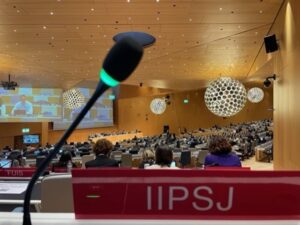
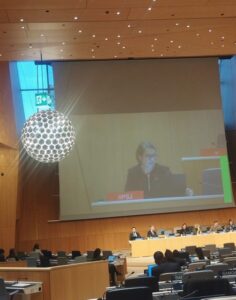
Blog Post: IIPSJ Written Statement Submitted to WIPO
IIPSJ Written Statement to the 44th Session of the WIPO Standing Committee on Copyright and Related Rights (SCCR)
November 6-8, 2023
IIPSJ is a WIPO Accredited Observer, seated in the United States, focused on matters domestically, and internationally. IIPSJ examines intellectual property laws and policies to see where full participation of disadvantaged, excluded, and marginalized groups may need redressing. IP systems should offer access, inclusion, and empowerment for all, not only a select group. At this time, we would like to add a few observations of general nature, to the 44th SCCRR Agenda Item Number 8.1 on the Proposal for Analysis of Copyright Related to the Digital Environment.
The digital environment offers both opportunities, and risks for the creatives, sharing their works online. Effective IP protection and exploitation must be considered against the interests of various groups of stakeholders. There is evidence across jurisdictions, that not all artists, creatives, or musicians, are making comparable income, and that some groups are marginalized by the IP systems. In 2021, the UK Intellectual Property Office conducted a survey, finding that women make from music seven thousand pounds less than men, who on average make twenty thousand pounds a year.i In 2022, a larger sample investigating the earnings by Black artists found, that on average, Black women make twenty-five percent less than white women.ii In 2023, evidence found that Black musicians with disabilities, have fewer opportunities in the sector still.iii
IIPSJ has an extensive network of scholars and sister organizations, who have explored the effects of IP systems on different groups of inventors and creatives, and they agree that the personal characteristics, such as gender(s), race, nationality, age, disability, class (or other), matter when it comes to access and enjoyment of IP systems (an intersectional approach). Making art, as making music, is a social activity, where conditions in which the individuals create, matter. WIPO’s commitment to an inclusive IP regime is demonstrated, among other, by its activities under “Intellectual Property, Gender and Diversity” and its current WIPO IP Gender Action Plan (IP GAP). IP GAP’s vision of gender equality will rely on research “to identify the scope and nature of the gender gap in IP and ways to close the gap”.iv IIPSJ would add to the action plan and stress that firstly, WIPO IP GAP commitments should be implemented in other WIPO Studies, Analysis, and Action Plans, across all Divisions (such as the here discussed Agenda #8.1), and secondly, that this research must be intersectional, to avoid any correctives which could continue to ignore artists, creatives, or musicians, who are currently disadvantaged, excluded and marginalized by the creative industries.
There cannot be a socially just approach towards building an inclusive IP system, if we focus ‘on gender alone,’ or operate under the assumption that the digital space is full of opportunities, equal to all. There is ample research to demonstrate that not all artists or creatives, have equal access or opportunities, to share their innovation and imagination with the world, to the mutual benefit of all in the society.
Prepared by Dr. Metka Potočnik
IIPSJ Associate Director for International Programs
i Intellectual Property Office, ‘Music creators’ earnings in the digital era’ (2021). Available: https://www.gov.uk/government/publications/music-creators-earnings-in-the-digital-era.
ii Black Lives in Music (BLIM UK), ‘Being Black in the UK Music Industry: Music Creators Part I’ (2021). Available: https://blim.org.uk/report/. For general research on women in UK music: Vick Bain, ‘Counting the Music Industry: the Gender Gap; A study of gender inequality in the UK Music Industry’ (2019). Available: https://vbain.co.uk/research/.
iii Black Lives in Music (BLIM UK), ‘Unseen. Unheard. Race and Disability – Black disabled experience in the UK’s music industry’ (2023). Available: https://blim.org.uk/report-unseen-unheard/.
iv World Intellectual Property Organization, ‘WIPO Intellectual Property (IP) and Gender Action Plan: the Role of IP in Support of Women and Girls’ (2022) 4. Available: https://www.wipo.int/women-and-ip/en/4.
Blog Post: IIPSJ Selects 2023-2024 Wikimedia Race and Knowledge Equity Fellows
2023-2024 Wikimedia Race and Knowledge Equity Fellows
KYRA ABRAMS
Bio:
Kyra Abrams is second year doctoral student at the University of Illinois at Urbana-Champaign. Her research interests surround data autonomy and data privacy, specifically what data autonomy would be like through a critical informatics perspective. She previously received her B.A. from UC Berkeley, where she studied interdisciplinary studies with a focus on techpolicy. She plans to become a tenure track professor at an R-1 Institution. Her hobbies include baking, reading, and listening to new music.
Project Description:
Throughout the duration of the fellowship, I aim to research the intersections between data autonomy and intellectual property and discuss critical analysis of law, policy, and court decisions. I intend to use critical content analysis as my methodology. This research will result in a whitepaper that will make recommendations to researchers and policymakers surrounding ways in which to respect data autonomy in accordance with what has and hasn’t worked for intellectual property rights in regards to marginalized communities.
AKSHAT AGRAWAL
Bio:
Akshat Agrawal is a litigator working in the courts of Delhi. He has finished his Masters in Law and Technology from the University of California, Berkeley School of Law, with pro bono honors. His LLM Thesis- “Resolving Copyright’s Distortionary Effects” pursued under the supervision of Prof. Talha Syed, will be upcoming in the Annual Review of the Berkeley Technology Law Journal, and was awarded Google’s Inclusive Copyright Thesis Award for the year 2023. Akshat is deeply interested in Copyright reform from the lens of law and political economy to ensure an inclusive cultural and knowledge policy.
Project Description:
The point of Copyright law, often misunderstood, was, is, and has always been to protect people who want to express in their lives from involuntary subjection to a market society, where their agency to express and participate in meaning-making is stomped by the requirement to meet basic needs which are only realized by thriving in a constant race for sustenance– the race of market competition. The only point of this legal tool is to enable self-preservation for all to the extent necessary to realize basic needs so that one continues to have agency and is enabled to produce expression. It is not to form a market. It is to enable, that is to protect from the inherent market logic- the logic of competing for your basic needs, irrespective of your social structural position (defined by involuntary social relations- that precede and our constitutive of our roles), with people in differential positions. Enablement in its legal scope however has a limit, especially when the enablement of one conflicts with the enablement of another- given the resource involved – speech- inherently constitutes and is constitutive of self-determination. Thus, the tool and its subsidiaries ought to be rethought- re-conceptualized in terms of scope, in terms of a continuum, or in terms of whether this tool of the right to exclude is even the best tool to achieve this goal of enablement or protection from involuntary subjection to a market society for basic needs of human flourishing. My focus, here at IIPSJ, is on proportionate enablement an idea fundamental to devising a method of fairly enabling, as well as, allowing partial amelioration of the structural losses suffered by those who have been invisible for long. The project will specifically focus on inducing this idea of proportionate enablement in knowledge distribution and shall identify modes of remedying publisher-researcher relations through better contractual clauses that are more accessible for researchers, fulfill the need for enablement for authors as well as ensure reasonable and not windfall recompense for publishers.
KAINEN BELL
Bio:
Kainen Bell is a Ph.D. student in Information Sciences at the University of Illinois at Urbana-Champaign. His research uncovers algorithmic biases and follows the work of digital rights activists and organizers of anti-surveillance campaigns in Brazil who protest facial recognition camera initiatives. Kainen’s goal is to learn how Afro-Brazilian communities collaborate to resist and prevent the abuse of surveillance technologies. He holds bachelor’s degrees in social work and business administration from the University of Washington in Seattle, and a master’s degree in social work from Columbia University in New York. Prior to his Ph.D., Kainen completed a Fulbright Research Fellowship in Brazil.
Project Description:
Through the support of the Wikimedia Race and Knowledge Equity (WRKE) Fellowship Program I will dedicate my time into creating resources, documents, and publications to support the efforts of the national anti-surveillance campaign in Brazil (#TireMeuRostoDaSuaMira). Over the past year I have been in conversation with Brazilian digital privacy rights activists and human rights organizations, and they have requested information about organizing efforts in the U.S. such as privacy protection laws created to ban or restrict the uses of facial recognition Technologies and collection of biometric data. They hope to use this information as a reference point for their own local organizing efforts. Through this project I strive to create a bi-directional exchange of knowledge and resources between these global communities.
ALBERT FOX CAHN
Bio:
Albert Fox Cahn is the Surveillance Technology Oversight Project’s ( S.T.O.P.’s) founder and executive director. He is also a Practitioner-in-Residence at N.Y.U Law School’s Information Law Institute and a fellow at the Harvard Kennedy School’s Carr Center For Human Rights Policy, Yale Law School’s Information Society Project, Ashoka, and TED. Albert received his J.D., cum laude, from Harvard Law School (where he was an editor of the Harvard Law & Policy Review), and his B.A. in Politics and Philosophy from Brandeis University.
Project Description:
I will use the fellowship as an opportunity to research the impact of library content filtering in blocking access to knowledge, particularly emerging threats to open inquiry in K-12 school libraries. Content filtering debates have existed for many years, but they take on new urgency in the post-Dobbs era. Working with librarians in states that seek to radically criminalize abortion care, I can identify how growing political and legal pressure is restricting library-based internet access to medically accurate information about abortion and other controversial topics. I would also examine the discriminatory impact of such restrictions, highlighting how restrictions in library-based internet compound the digital divide. For deliverables, the project would provide (at a minimum) a whitepaper geared towards lay readers and the press, using S.T.O.P.’s proven capacity to garner significant media attention. Additionally, I could create public explainer materials for the web and social media, distilling the key themes into infographics and other easily shared materials. Time permitting, I would also create additional materials targeted at supporting impacted librarians.
SHUBHA GHOSH
Bio:
Shubha Ghosh is Crandall Melvin Professor of Law at Syracuse University College of Law where he teaches and researches in the fields on intellectual property commercialization and technology law. His scholarship focuses on exhaustion of intellectual property rights, biotech and biomedical patenting, and issues of distributive justice. He earned a BA from Amherst College, a PhD from Michigan, and a JD from Stanford.
Project Description:
My starting point for my work as a Fellow is to develop an overlooked criticism of the Bayh-Dole Act: its overemphasis on universities and its exclusion of other institutions that can serve to channel creative energies to the public. Elementary schools, secondary schools, magnet schools, young entrepreneurs’ clubs, art schools—each engage students in developing their creativity and inventiveness. Yet, there is little engagement with the debates over intellectual property, crowd sourcing, and follow-on innovation that pervade many universities. Often lessons about intellectual property are reduced to warnings against downloading or arousing fear of Internet piracy. Less attention is paid to harnessing creativity and invention to the values of exchange and transferring knowledge. Several initiatives from the Wikimedia Race and Knowledge Equity project could remedy these gaps. First, a comprehensive state by state study of programs at the elementary and secondary school levels that target creativity and inventiveness among students. Identified programs could be studied to see how they engage with science, technology, engineering, arts and mathematics. (STEAM) curricula. Having identified the programs, my fellowship work would develop a survey to identify the needs of several of these programs with particular attention to open questions of intellectual property, knowledge sharing, and distribution of resources for teaching and encouraging innovation. These questions will serve as the basis for identifying policy reforms at the state and federal levels, building in part on the promise of the Bayh-Dole Act while reforming its vision and policy reach beyond the universities. White papers would be the work product of this extensive research with the Wikimedia imprimatur and my scholarly skills targeting key policy figures at the federal and state levels to alert them about the overlooked potential for students to learn about the links among creativity, commercialization, and public dissemination. Wikimedia White Papers on this topic will educate policymakers about programs to promote innovation outside the university ecosystem and their needs as we create new knowledge ecosystems.
OROMA WOMEODU
Bio:
R. Oroma Womeodu earned a J.D. from Tulane University Law School and a Bachelor’s Degree in Political Science from Wingate University. During her time at Tulane she acted as Managing Editor of Tulane’s Journal of Technology and Intellectual Property where she fostered an interest in and focus on intellectual property protection for Black fashion designers and similarly marginalized creator groups. She is committed to ensuring all creators are afforded adequate access to IP protection and hopes to one day assist in policymaking that contributes to this goal in America as well as her home nation of Nigeria. She spends her free time on the tennis court coaching players ranging from beginner to advanced.
Project Description:
I will be working with Dr. John R. Whitman as a research assistant on his book Making the Most of Prison. In this role, my deliverables will include creating a white paper on current impediments for the copyright registration process for people in prison, researching and proposing an adjusted copyright registration process for imprisoned people, as well as creating a directory of attorneys and firms that do work in furtherance of protecting incarcerated people’s intellectual property and potentially organizing a panel discussion including these practitioners.
IIPSJ Attendance at the 64th World Intellectual Property Organization General Assemblies
(WIPO GA) (Geneva, 6-14 July 2023)
By Dr. Metka Potočnik (she/her/hers), Senior Lecturer in Law, Wolverhampton Law School
IIPSJ attended the 64th World Intellectual Property Organization (WIPO) General Assemblies (GA), in their capacity as the WIPO Accredited Observer. IIPSJ attended the official hearings at the WIPO Headquarters in Geneva, with the Associate Director for International Programmes, Dr Metka Potočnik, attending the length of the proceedings in person. These assemblies brought together a record number of delegates, with over 1,200 delegates in attendance, which exceeded the pre-Covid numbers of attendance in the General Assemblies. A full list of participants is available here, and all the sessions are available for viewing here.
IIPSJ previously observed several WIPO meetings online and took this GA as an opportunity to create strategic partnerships with Member States and other stakeholders, interested in creating access, inclusion and empowerment for under-represented creators and innovators in the global eco-system. IIPSJ representative attended the 10th WIPO-NGO Stakeholder Dialogue, which was organised in parallel with the 64th WIPO GA and took place on Monday, 10 July 2023, at WIPO New Building. WIPO Director General Tang and other WIPO experts met with over 40 Accredited Observers and NGOs, in discussing important issues, which require a multi-stakeholder response. The event has been placed in the spotlight for its importance, and more can be read here.
IIPSJ is aiming to contribute to the future discussions in WIPO, with the aim of building a more inclusive WIPO eco-system. The IIPSJ team are working towards a meaningful participation in the 44th Session of the Standing Committee on Copyright and Related Rights (SCCRR) (see here) and the 31st Session of the Committee on Development and Intellectual Property (CDIP) (see here). If you are interested in contributing to IIPSJ work in this space, do contact the IIPSJ directly.
Dr Metka Potočnik, IIPSJ Associate Director for International Programmes, Representing IIPSJ at the Opening of the 64th WIPO GA, Thursday, 6 July 2023, WIPO, Geneva, Switzerland Copyright: WIPO. Photo: Emmanuel Berrod. This work is licensed under a Creative Commons Attribution-NonCommercial-NoDerivatives 4.0 International License.
Dr Metka Potočnik in attendance, representing the IIPSJ at the WIPO-NGO Stakeholder Dialogue, at the 64th WIPO GA, Monday, 10 July 2023. WIPO Director General Tang addressing the WIPO NGOs and Accredited Observers. Copyright: WIPO. Photo: Violaine Martin. This work is licensed under a Creative Commons Attribution 4.0 International License.


